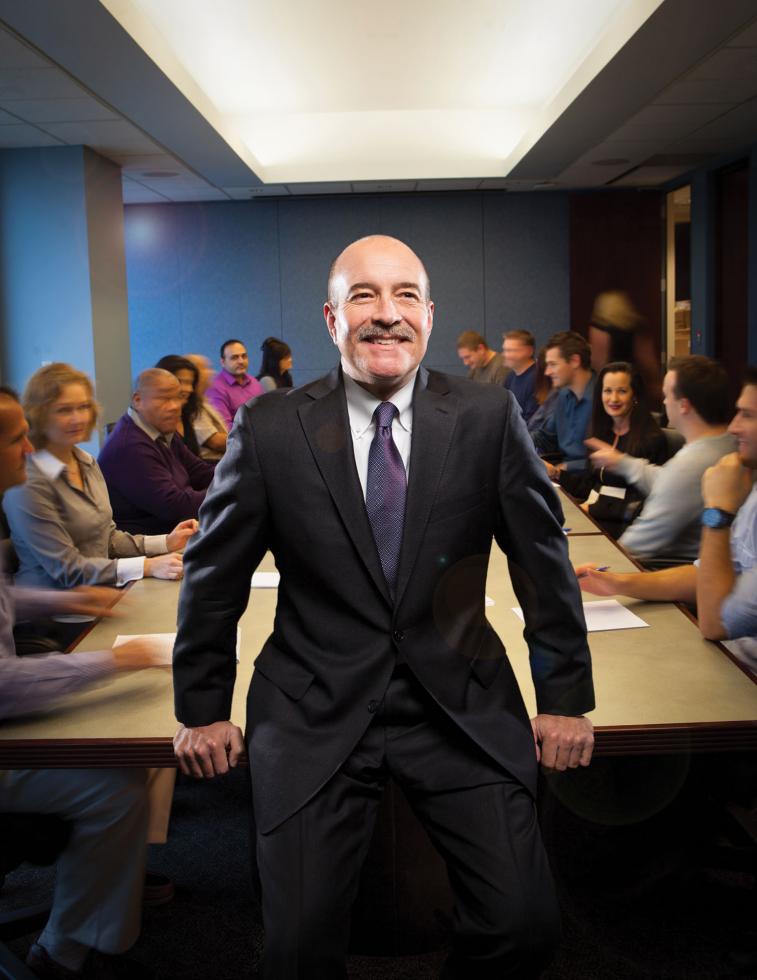Rob Lynch, 57, was named the third president and CEO of VSP
Global in 2006.

In August of last year, it was reported that local eye-care titan VSP would be excluded from competing for individual members in the state’s health insurance exchange market because the vision plan it provides is a stand-alone program. The move lead to conversations that VSP might relocate its headquarters out of state.
“VSP being initially locked out of participating in the state health exchange had nothing to do with the federal health mandate. We just got lost in the shuffle in a block vote on 250 items. Once the exchange board realized we offered an individual product, the situation was rectified rather quickly.”
“They weren’t aware that we were covering 23,000 Californians with our individual product and that we offered this product in all 50 states. We pointed out publicly that this was a miss and why. We worked with the exchange board to draft an acceptable change on one item that was [accepted]. There was tremendous support from the governor all the way down.”
“Since resolving our issues with the state exchange board, we are now seeking to fill 150 support positions that had been on hold. Additionally, we will be adding 250 new lab positions at our Rancho Cordova facility. With [the closures of] Campbell’s (Soup Co.) and Hostess, we have created fantastic production-level jobs for our region.”
“Now that the Affordable Care Act is being implemented, everybody will soon have a better idea how it impacts them. When you look at Commonwealth countries that have gone down the road of providing national health care, most originally included dental and vision care. However, in most cases, those services got pulled away as costs and budgets got out of control.”
“In the act, there is a provision for 10 essential health benefits, one of them being pediatric optometric care. There’s still a question as to what that benefit actually entails. However, there is no provision for adult vision or dental care. It doesn’t appear that there will be funding for that. Hopefully, the pediatric benefit will include a comprehensive exam.”
“VSP can absolutely thrive under the Affordable Care Act. The act is making insurance available to 38 million people not currently insured. We just want to be able to compete and provide our services to those folks. There’s a tremendous opportunity for us to expand our vision of vision care. Its passage is actually a very good thing for us.”
“We help people see. As a private, not-for-profit, community-based company, we have no owners. So any surpluses we generate go back into the business. We don’t have shareholders that we are beholden to. Basically, we’re here to provide access to high-end, affordable vision care to as many people as possible.”
“The other nuance about VSP is that we pay taxes. When you think about health care systems and what’s going on in the U.S., being a not-for-profit is a pretty efficient way to provide services. Blue Shield has a great ad campaign running right now. It says, ‘We’re not for profit, we’re for health.’ That’s our approach as well.”
“This doesn’t mean we’re not running a competitive business, because we are. It doesn’t mean we don’t make money. We have to. If we don’t, we don’t stay in business. But what it does mean, as we grow the business, is that everything that we do, all the surpluses that we create, goes back into the system to make it more efficient at providing quality care.”
“This approach also allows us to be a great place to work. VSP has always had a real focus on community. Not just as a not-for-profit, but also through actions of giving back both monetarily and through volunteer time by employees. People that work here have bought into this community focus. They are not stockholders, but they have an ownership mentality. This collaborative feeling has crossed over into VSP Global companies that we have acquired over the past seven years.
“I’m concerned that our friends in the Legislature tend to forget that the Capital Region is important. It’s not just about the Bay Area and the three Southern California counties. This region needs to be dynamic, pro-business and have a diverse economy. As a global company, this has become exceedingly important to us. To say that the region is lagging behind the Bay Area and Southern California is putting it very kindly.”
“To support and grow our global headquarter operations here, we need to be able to attract and retain talent. To accomplish that, we need this region to be viable and vibrant from a business standpoint. We also need the state as a whole to be viewed as business receptive.”
Recommended For You

Convenient Care
How concierge medicine is changing the health care marketplace
Think of your best friend, a friend that knows all your ticks, hobbies and vices. Now imagine this friend happens to be a doctor, and she’s your doctor.

Are Attorneys the Rx For Obamacare?
Changes in healthcare shift law agencies into high gear
Hospitals, law firms and state agencies involved in implementing the Affordable Care Act have seen a sizable bump in workload — and in some cases, staff sizes — as they prepare for the major overhaul mandated by the 2010 law and to adjust to other industry changes.


